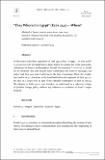Files in this item
“They whored in Egypt” (Ezek 23:3)—When?
Item metadata
| dc.contributor.author | Lyons, Michael A. | |
| dc.date.accessioned | 2021-12-20T11:30:02Z | |
| dc.date.available | 2021-12-20T11:30:02Z | |
| dc.date.issued | 2022-11-11 | |
| dc.identifier | 274559057 | |
| dc.identifier | 3eb2e88f-1ec7-4f34-8b64-9e7e7d8337b7 | |
| dc.identifier | 85122663897 | |
| dc.identifier.citation | Lyons , M A 2022 , ' “They whored in Egypt” (Ezek 23:3)—When? ' , Vetus Testamentum , vol. 72 , no. 4-5 , pp. 676-687 . https://doi.org/10.1163/15685330-bja10077 | en |
| dc.identifier.issn | 0042-4935 | |
| dc.identifier.other | ORCID: /0000-0003-2940-3965/work/105007252 | |
| dc.identifier.uri | https://hdl.handle.net/10023/24543 | |
| dc.description.abstract | In this essay I make three arguments on Ezek 23:3–4: first, “in Egypt … in their youth” (v. 3) does not refer to Israel’s time in Egypt before the exodus, but to the early political histories of Samaria and Jerusalem. Second, the statement ותהיינה לי (v. 4) should not be rendered “and they became mine” (referring to the event of marriage), but rather “and they were mine” (referring to the fact of marriage). Third, the vocabulary used in vv. 3–4 functions at the local level within the argument of Ezek 23:1–27, but also on a larger level as part of the editorial coordination of Ezek 16 and 23. The allegory in Ezek 23:1–27 can therefore be understood as a coherent critique of Judahite foreign policy, without any reference to traditions of Israel’s origins in Egypt. | |
| dc.format.extent | 293023 | |
| dc.language.iso | eng | |
| dc.relation.ispartof | Vetus Testamentum | en |
| dc.subject | Ezekiel 23 | en |
| dc.subject | Allegory | en |
| dc.subject | Jerusalem | en |
| dc.subject | Samaria | en |
| dc.subject | Egypt | en |
| dc.subject | BS The Bible | en |
| dc.subject | T-NDAS | en |
| dc.subject | AC | en |
| dc.subject.lcc | BS | en |
| dc.title | “They whored in Egypt” (Ezek 23:3)—When? | en |
| dc.type | Journal article | en |
| dc.contributor.institution | University of St Andrews. School of Divinity | en |
| dc.identifier.doi | https://doi.org/10.1163/15685330-bja10077 | |
| dc.description.status | Peer reviewed | en |
This item appears in the following Collection(s)
Items in the St Andrews Research Repository are protected by copyright, with all rights reserved, unless otherwise indicated.

